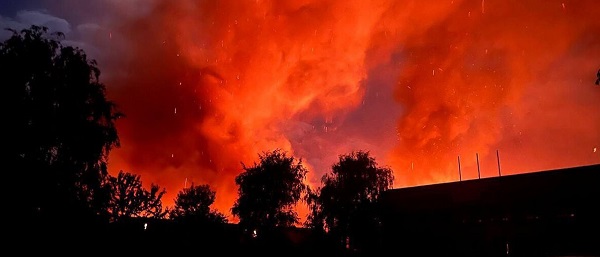conflict
Col. Macgregor: Ukraine’s ‘useless’ incursion into Russia ‘cooked up at NATO’

From LifeSiteNews
By Frank Wright
In a new interview, retired U.S. Army Colonel Douglas Macgregor explains the escalation of tensions in Ukraine and in Israel as the result of deliberate attempts to destabilize Russia and the entire region of the Middle East.
In a new interview, retired U.S. Army Colonel Douglas Macgregor, one of the founders of the rapidly growing organization Our Country, Our Choice, explains the escalation of tensions in Ukraine and in Israel as the result of deliberate attempts to destabilize Russia and the entire region of the Middle East.
“Insane as that sounds to most Americans,” warns Macgregor, these actions are undertaken at a time when the “U.S. is dangerously overstretched.”
So far, he says, “we are fortunate that worse things have not happened to us.”
Yet as Macgregor explains, what has happened as a result of the actions of Western regimes is so damaging, and dangerous, that the populations of “the Western hemisphere” must consider removing their own governments in order to survive them.
Macgregor’s video analysis, released on August 20, can be seen here:
Not only are the people of the West excluded from the decisions which are destroying their world, he says, but in the case of Israel, even the U.S. government itself is not deciding American foreign policy. This, he says, has to end – before everything else does.
A global(ist) crisis
The crises faced by the U.S. have stretched it to breaking point at home – and abroad.
“Everywhere you want to look – in Europe, in the Middle East, in the Indo-Pacific – our positions are worsening by the day,” he says.
“Americans don’t have any control over their government. They’re bystanders … they’re watching other people make policy decisions, in some cases life or death decisions, in the Middle East and Eastern Europe as well as here at home with the border. They’re never consulted. They’re never asked anything. They’re just told to shut up.”
Americans, says Macgregor, have tolerated this due to domestic prosperity – which has now vanished.
Macgregor says with falling living standards as a result of this industry of permanent war and a permanent state of emergency at home, “these days are over.”
He says of the U.S, “The world is sick of us,” saying this is why a parallel system to that led by the U.S. is emerging in the Chinese and Russian-led BRICS bloc.
Yet when Macgregor moves to analysis of U.S.-Israeli politics, he says that not only are the American people not in control of their government, but the U.S. government is itself not in control of its own foreign policy.
“The truth of the matter is that Mr. Netanyahu, not Mr. Biden or his administration, is in is in charge of what’s happening in the Middle East.”
Shockingly, Macgregor, a former adviser to the Trump administration, says this means Israel directs U.S. soldiers and its military into action.
“When I say ‘in the Middle East’ I mean he controls what we will or will not do militarily – we don’t,” he says. “Netanyahu has got control of Congress and we are going to unconditionally support him until somehow or another it harms us.”
“Only when it harms us in a demonstrable way – not a way in which it can be concealed.”
This is the reason, Macgregor says, for the focus of U.S. politicians such as Lindsey Graham on promoting a war in Iran, which is “not in the U.S. national interest.”
“This business of blaming Iran or for that matter anybody else in the Middle East for everything that’s wrong is not only misguided, it’s stupid. It’s bad policy, but we’ve adopted it [because] the Israelis have insisted upon it.”
Netanyahu, says Macgregor, does not want peace. Instead, the Zionist leader sees “a once-in-a-century opportunity to annihilate everyone in the region who does not bend the knee to Israel.”
Moving to Ukraine, Macgregor bluntly explains why everything we are told about the Ukraine war is simply untrue.
“Mr. Zelensky realizes he is dealing with a lot of suckers in the West,” he said. “We are not getting the truth about Ukraine – or about anything our leadership doesn’t want us to know.”
Macgregor supports this viewpoint with reference to the recent incursion by Ukraine into the Russian region of Kursk, portrayed as a blow against Putin which could “change the direction of the war” in Western media.
“This was an idea cooked up at NATO. This made no sense. Worse than a gamble, it was a useless exercise to destroy some of your best remaining troops,” he says, adding that the British and Americans “had a big hand in pushing this.”
His remarks echo those of former U.K. Prime Minister and previous U.K. Foreign Secretary David Cameron, who stated on camera in May that Britain’s war policy on Ukraine is “fixed” and will not change with a new government.
Cameron also said that attacks on Russia will be intensified “over the summer” to give the impression that Ukraine is winning.
Macgregor says NATO troops were directly involved: “We are hearing reports up to 2,000 of these troops may have been British and Americans in Ukrainian uniforms.”
Macgregor speaks of “sheep dipping” NATO troops to present them as Ukrainian soldiers.
Russian Foreign Minister Sergei Lavrov said in a statement included in the video that Zelensky would “never have dared” to launch the Kursk incursion into Russia “unless he was instructed to do so by the United States of America.”
Indicating the colossal damage the war has wrought beyond the borders of both Russia and Ukraine, Lavrov went on: “No one now has any doubts … the USA is behind the explosions of Nord Stream, which have left Europe without cheap Russian energy and consequently without a sustainable basis for economic development.”
Western media routinely labels noticing the obvious as a form of treason. To point out that the policies of the liberal-globalist governments of the West are suicidal is to repeat “Putin’s talking points.”
Instead, the mainstream media repeats the words of Zelensky. What does Macgregor have to say about that?
“Anyone who believes anything Zelensky says needs to see a psychiatrist. There is no truth in anything that man says, or for that matter, in anything he has ever said.”
Kursk: a Western media fiasco
Macgregor explains how the Kursk incursion has been a briefly successful media event bought at the cost of total disaster for the ground troops and their tanks and armor, which he says are now encircled and will be “completely annihilated.” Yet the militarily “disastrous” operation has further galvanized the Russian public, he warns. His report was issued as a massive drone attack has been launched on Moscow, a further provocation towards full-scale war between NATO and the Russians.
The Russian population is “enraged and furious,” says Macgregor, “much more than the people in the West understand.” They are demanding Putin “march West” and smash Ukraine totally, he says.
Putin, according to Macgregor, is opposed to this idea, being only concerned with securing the ethnic Russian population in the east of Ukraine.
“We have awakened a beast,” says Macgregor, reminding viewers the Russian government “does not want to govern Ukrainians.” He also insists a chaotic end is in sight for the Zelensky regime.
Despite what Zelensky says in public, says Macgregor, “privately we know his bags are packed.” With homes from Switzerland to Florida, he will be leaving “with cartloads of U.S. cash” as was seen in the chaotic withdrawal from Afghanistan, Macgregor explained, before darkly suggesting that “it may be Ukrainian soldiers … which ‘bump him off.’”
With the end of corrupt regimes in mind, Macgregor stated that the liberal-globalist regimes in the West are so dangerous to their own people that they must be replaced.
“I think it’s time for the governments in Germany and other ‘corrupt’ European states to ‘be removed,’” he said.
Citing the escalation driven by these regimes towards full-scale conflict with Russia, he said that if they aren’t removed, European and British populations “could end up in another accident which could be disastrous for Europe.”
Western peoples are being led into Armageddon, he claims, by an elite which seeks to provoke a war which could result in a nuclear exchange.
Macgregor’s warning is bolstered by independent reports of the extraordinary degree of British involvement in the war in Ukraine. Grayzone journalist Kit Klarenberg has written of Kursk being “a British operation” entirely, saying the U.K. is announcing itself with this operation as a “formal belligerent” in the war against Russia.
In a piece titled “Britain’s Kursk Invasion Backfires,” Klarenberg counts the cost of this “clear suicide mission,” which has seen the “Biden administration distance itself from the action” and has sabotaged yet another move towards peace.
Echoing Macgregor’s warning to liberal-globalist governments across Europe, that of Germany has now dramatically reduced its support for the war, recognizing that the threat of full-scale conflict with Russia is leading populations to turn against regimes in support of escalation in Ukraine.
Klarenberg also notes the Wall Street Journal now claims Ukraine is solely responsible for the Nord Stream bombings – a framing which is unlikely to improve relations with Germans.
The Western alliance is fracturing, Macgregor suggests, as populations turn on the politicians which have led them to the brink of civilizational collapse.
Fighting back
In the service of the restoration of sanity to the political life of the West, Macgregor is promoting a network he compares to that which kept the American Revolution alive.
A new platform named “Republic,” says Macgregor, is going to be used by his organization Our Country, Our Choice, to provide real news and promote national and international cooperation across the West – along with legal and political tools for subscribers, including contact details for U.S. and European politicians and networks.
“This is like the committees of correspondents during the Revolutionary War. All of the revolutionary congresses or parliamentary bodies had committees, and these committees contacted each other kept each other informed and were part of the lifeblood that kept the American Revolution going through really hard times,” he said.
Macgregor states “this will not be canceled.” His case in defense of life, and that of the Western civilization he wishes to defend as a committed Christian soldier, is being made not only in words but in deeds
He says these measures will help to correct the deliberate exclusion of the American and Western peoples from the processes of power which threaten their very existence.
You can keep abreast of Macgregor’s initiative to “stop globalism” and “defend the U.S. from attacks on its borders, religious freedom, and from endless wars” at Our Country, Our Choice here.
Artificial Intelligence
AI Drone ‘Swarms’ Unleashed On Ukraine Battlefields, Marking New Era Of Warfare


From the Daily Caller News Foundation
Artificial intelligence-powered drones are making their first appearances on the battlefield in the Russia-Ukraine war as warfare creeps closer to full automation.
In bombardments on Russian targets in the past year, Ukrainian drones acting in concert were able to independently determine where to strike without human input.
It’s the first battlefield use of AI “swarm” technology in a real-world environment, a senior Ukrainian official and Swarmer, the company who makes the software, told the Wall Street Journal in a Tuesday report. While drones have increasingly defined modern battlefields, swarms until now had been confined to testing rather than combat.
“You set the target and the drones do the rest,” Swarmer Chief Executive Serhii Kupriienko told the WSJ. “They work together, they adapt.”
So far, the Swarmer technology has been used hundreds of times to target Russia assets, but was first used a year ago to lay mines on the front, the Ukrainian official told the WSJ. The software has been tested with up to 25 drones at once, but is usually utilized with only three.
Kupriienko told the WSJ that he was preparing to test up to 100 drones at once with the linking software.
A common arrangement used on the battlefield includes one reconnaissance drone to scout out the target and two explosive drones delivering the payload on target, the official told the WSJ.
While Western nations such as the U.S., France and the United Kingdom are also pursuing drone swarm technology, they have not deployed swarm technology on the battlefield the way Ukraine has, according to the WSJ. Currently, autonomous weapons are not regulated by any international authority or binding agreement, but ethical concerns around the technology has led many to call for increased regulation of weapons like the Swarmer system.
The Ukrainian Ministry of Foreign Affairs did not immediately respond to the Daily Caller News Foundation’s request for comment.
conflict
Trump Pentagon Reportedly Blocking Ukraine From Firing Western Missiles Deep Into Russia


From the Daily Caller News Foundation
The Department of Defense has spent months blocking the Ukrainian military from using American and British-made missiles to hit targets deep inside Russia, The Wall Street Journal reported Sunday, citing unnamed U.S. officials.
Undersecretary of Defense for Policy Eldridge Colby reportedly designed the procedure to review requests to carry out the long-range strikes with weapons that are either of U.S. origin or that require American intelligence or use components provided by the U.S., according to the WSJ. Secretary of Defense Pete Hegseth reportedly has the final say on whether Ukrainian forces can use the MGM-140 ATACMS (Army Tactical Missile System) to hit targets in Russia.
The reported blocks on missile strikes coincides with a Trump administration effort to broker a peace deal between Russia and Ukraine. A Pentagon spokesperson declined to comment further on the matter.
BREAKING: President Vladimir Putin reacts to B-2 Flyover pic.twitter.com/1mzVn7DxlW
— Jack Poso 🇺🇸 (@JackPosobiec) August 15, 2025
The Biden administration allowed Ukraine to carry out strikes with ATACMS in November, weeks after President Donald Trump won the 2024 election, the New York Times reported. Trump criticized the move during a December interview with Time magazine.
“It’s crazy what’s taking place. It’s crazy,” Trump said. “I disagree very vehemently with sending missiles hundreds of miles into Russia. Why are we doing that? We’re just escalating this war and making it worse. That should not have been allowed to be done.”
Trump and Russian President Vladimir Putin met in Alaska on Aug. 15 for a summit meeting during which Trump sought to secure a cease-fire in Russia’s war with Ukraine. As Trump greeted Putin, a B-2A Spirit stealth bomber and several fighters carried out a flyover of Elmendorf Air Force Base.
Trump met with Ukrainian President Volodymyr Zelensky and major European leaders on Aug. 18 to update them on the summit.
In July, Trump reached an agreement with NATO where members of the alliance would purchase weapons, including MIM-104 Patriot surface-to-air missiles, and donate them to Ukraine.
-

 Indigenous2 days ago
Indigenous2 days agoIndigenous activist wins landmark court ruling for financial transparency
-

 COVID-1921 hours ago
COVID-1921 hours agoCrown seeks to punish peaceful protestor Chris Barber by confiscating his family work truck “Big Red”
-

 Alberta2 days ago
Alberta2 days agoRed Deer’s Jason Stephan calls for citizen-led referendum on late-term abortion ban in Alberta
-

 espionage2 days ago
espionage2 days agoSoros family has been working with State Department for 50 years, WikiLeaks shows
-

 MAiD1 day ago
MAiD1 day agoHealth Canada suggests MAiD expansion by pre-approving ‘advance requests’
-

 Alberta22 hours ago
Alberta22 hours agoPremier Danielle Smith says attacks on Alberta’s pro-family laws ‘show we’ve succeeded in a lot of ways’
-

 Agriculture8 hours ago
Agriculture8 hours agoHealth Canada indefinitely pauses plan to sell unlabeled cloned meat after massive public backlash
-

 Indigenous22 hours ago
Indigenous22 hours agoCanadian mayor promises to ‘vigorously defend’ property owners against aboriginal land grab




